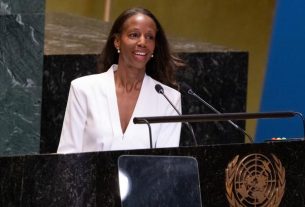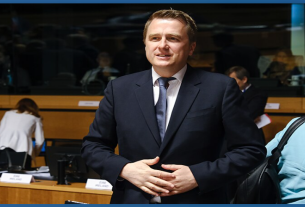1. Sudan: Escalating Humanitarian Catastrophe and Urban Warfare
The United Nations has labeled the conflict in Sudan a “crisis of humanity,” citing systemic atrocities amid continued clashes between the Sudanese Armed Forces (SAF) and the paramilitary Rapid Support Forces (RSF). UN mission expert Mona Rishmawi highlighted alarming patterns of sexual violence, starvation, and obstruction of aid, with 14.3 million people displaced and tens of thousands killed to date. The RSF’s recent attack on a shelter in El Fasher, killing at least five displaced civilians and injuring over 30, underscores the growing use of heavy weaponry in populated areas. Both parties stand accused of manipulating humanitarian assistance, worsening the largest displacement crisis globally.
Source: UN Mission, Sudan Tribune
2. Nigeria & Sahel Security: AFRICOM Urges African-led Solutions
Outgoing AFRICOM Commander Gen. Michael Langley underscored Nigeria’s pivotal role in stabilizing West Africa, stating, “If Nigeria wins, West Africa wins.” He emphasized African-led and -owned security operations, stressing civil-military collaboration, youth engagement, and respect for sovereignty. Amid increasing extremist violence across the Sahel, AFRICOM reiterates its support for capacity-building, not dependency.
Source: Premium Times
3. Nigeria: Internal Displacement Crisis in Benue State
Over 6,500 people have been displaced by renewed violence in Benue State, Nigeria. The National Emergency Management Agency (NEMA) reported a significant humanitarian need, particularly for women and children. Relief efforts, coordinated by SEMA, UNHCR, Red Cross, and IOM, are centered on a newly established IDP camp in Makurdi.
Source: Premium Times
4. Mali: Military Regime Strengthens Control and Shifts East
Mali’s military junta, led by Gen. Assimi Goïta, has extended its rule by five years, solidifying authoritarian control amidst worsening insecurity. Despite promises to curb jihadist violence, terrorist activity has intensified and spread geographically. Mali continues to deepen ties with Russia, launching a Russian-backed gold refinery and asserting control over foreign-operated mining ventures. Civil liberties remain severely curtailed, with media repression and arrests of opposition figures escalating.
Source: DW, BBC
5. Cameroon: Uncertainty Ahead of 2025 Presidential Election
With elections scheduled in under four months, Cameroon faces uncertainty over President Paul Biya’s health and unresolved security crises. The 92-year-old, in power since 1982, presides over a fragmented political opposition, ongoing Anglophone separatist unrest, and Boko Haram insurgency in the north. The prevailing instability risks undermining electoral integrity and national cohesion.
Source: AFP
6. Eritrea: UN Condemns Entrenched Repression and Rights Abuses
A UN human rights expert denounced Eritrea for “systemic” violations under President Isaias Afwerki’s decades-long rule. The regime continues to enforce indefinite national service likened to slavery, suppress dissent, and curtail freedoms. Eritrea remains one of the most repressive states globally, prompting renewed international calls for accountability.
Source: AFP
7. Ethiopia-Morocco: Deepening Bilateral Defense Ties
Ethiopia and Morocco have formalized a new defense cooperation agreement, establishing a joint military commission and prioritizing joint training, military health, and research. Future collaboration is set to include cybersecurity and defense industry development. This move reflects Ethiopia’s strategic diversification of defense partnerships amid regional security concerns.
Source: Addis Standard
8. Ethiopia: Cholera Cases Decline in Amhara Amid Coordinated Response
Africa CDC reports a marked decline in daily cholera cases in Ethiopia’s Amhara region following a joint intervention with national and regional health bodies. The outbreak, linked to poor WASH infrastructure and large religious gatherings, has claimed 15 lives. The response focused on surveillance, risk communication, and health systems strengthening.
Source: Africa CDC, Addis Standard
9. Ghana: National Service to Pilot Military Training
Ghana will pilot a six-week Basic Military Training (BMT) as part of its 2025/2026 national service program. The initiative, voluntary and collaborative with the Ministry of Defence, aims to instill discipline and national cohesion among graduates. It reflects a broader agenda to strengthen civic responsibility and national resilience.
Source: Joy Online
10. Zimbabwe: Former Minister Detained Ahead of Corruption Trial
Walter Mzembi, Zimbabwe’s former foreign minister under Robert Mugabe, has been denied bail following his arrest on graft charges dating back to 2018. Accused of misappropriating $1.6 million in public funds, Mzembi’s detention marks an intensifying crackdown on former regime officials under President Emmerson Mnangagwa’s administration.
Source: AFP
Outlook Summary
Africa’s security, governance, and humanitarian landscape remains highly dynamic. Sudan’s conflict poses acute humanitarian and regional security risks, while Mali’s authoritarian drift and Cameroon’s electoral uncertainty spotlight democratic backsliding. Meanwhile, initiatives in Ethiopia, Ghana, and Nigeria underscore efforts at reform and resilience-building, although they remain challenged by persistent conflict, displacement, and public trust deficits, however the continent resilient and ability to bounce back from any challenges has always been extraordinary.
Prepared by: thenewsintel.com media team
Date: 18 June 2025



